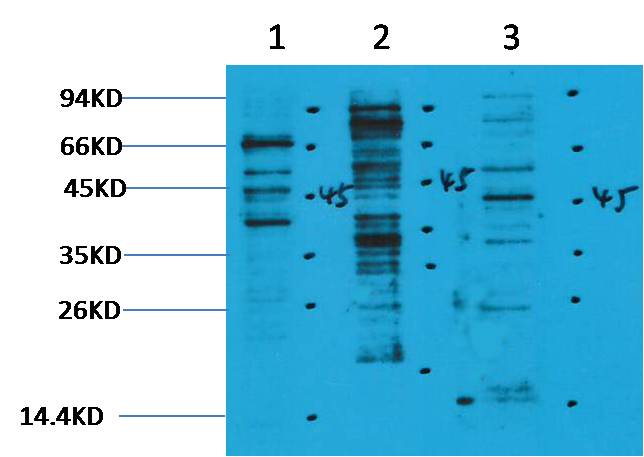
| WB | 咨询技术 | Transfected |
| IF | 咨询技术 | Transfected |
| IHC | 咨询技术 | Transfected |
| ICC | 技术咨询 | Transfected |
| FCM | 咨询技术 | Transfected |
| Elisa | 咨询技术 | Transfected |
| WB Predicted band size | Refer to figures |
| Host/Isotype | Rabbit IgG |
| Antibody Type | Primary antibody |
| Storage | Store at 4°C short term. Aliquot and store at -20°C long term. Avoid freeze/thaw cycles. |
| Species Reactivity | Transfected |
| Immunogen | Recombinant Protein of Pan Methyl Lysine |
| Formulation | Purified antibody in PBS with 0.05% sodium azide,0.5%BSA and 50% glycerol. |
+ +
以下是3-4篇关于 **Methyl-Lysine抗体** 的参考文献及其摘要内容的简要整理:
---
1. **文献名称**:*"Specificity and Function of Histone Lysine Methylation"*
**作者**:Barski, A. et al.
**摘要**:该研究系统分析了组蛋白赖氨酸甲基化(如H3K4me2、H3K27me3等)的生物学功能,并验证了多种甲基化特异性抗体的应用。通过染色质免疫沉淀测序(ChIP-seq)技术,揭示了不同甲基化修饰在基因激活或沉默中的调控作用。
2. **文献名称**:*"Recognition of Histone H3 Lysine-9 Methylation by HP1 Chromo Domain"*
**作者**:Bannister, A.J. et al.
**摘要**:本文首次报道了H3K9me3特异性抗体在检测异染色质形成中的关键作用。研究表明,HP1蛋白通过其染色质结构域(Chromo domain)特异性识别H3K9me3.并利用抗体实验证实了这一相互作用在基因沉默中的机制。
3. **文献名称**:*"A Bivalent Chromatin Structure Marks Key Developmental Genes in Embryonic Stem Cells"*
**作者**:Bernstein, B.E. et al.
**摘要**:研究利用H3K4me3和H3K27me3双特异性抗体,发现胚胎干细胞中发育相关基因同时存在激活性和抑制性组蛋白甲基化修饰(“双价态染色质”),揭示了甲基化抗体在解析表观遗传调控网络中的重要性。
4. **文献名称**:*"Antibody-based Detection of Histone Modifications in Disease Models"*
**作者**:Rothbart, S.B. et al.
**摘要**:该文献系统评估了多种商品化甲基赖氨酸抗体(如H3K36me2、H4K20me1)的特异性和灵敏度,提出了抗体标准化验证的方法,并应用于癌症模型中异常组蛋白甲基化的检测。
---
这些文献涵盖了甲基赖氨酸抗体在表观遗传学机制研究、抗体验证标准化及疾病模型中的应用,可作为相关领域的核心参考。
Methyl-lysine antibodies are essential tools in studying post-translational modifications (PTMs) of proteins, particularly lysine methylation—a key epigenetic and signaling regulatory mechanism. Lysine methylation involves the transfer of methyl groups to the ε-amino group of lysine residues, catalyzed by methyltransferases. This reversible modification, occurring in histones and non-histone proteins, regulates diverse cellular processes, including chromatin remodeling, gene expression, DNA repair, and protein-protein interactions. For example, histone H3 lysine 4 trimethylation (H3K4me3) is associated with active transcription, while H3K27me3 marks repressive chromatin.
Methyl-lysine antibodies are designed to detect specific methylated lysine residues, distinguishing between mono-, di-, and tri-methylation states. Their development relies on synthetic methyl-lysine-containing peptides as immunogens. Specificity is critical, as methylation sites often differ by a single lysine position or methylation degree. These antibodies are widely used in techniques like chromatin immunoprecipitation (ChIP), immunofluorescence, and Western blotting to map methylation patterns in health and disease. Dysregulation of lysine methylation is linked to cancers, neurological disorders, and developmental defects, making these antibodies vital for mechanistic studies and biomarker discovery. However, batch variability and off-target binding necessitate rigorous validation using knockout controls or competitive peptides. Advances in antibody engineering and proteomics continue to enhance their precision and applications in epigenetics research.
×